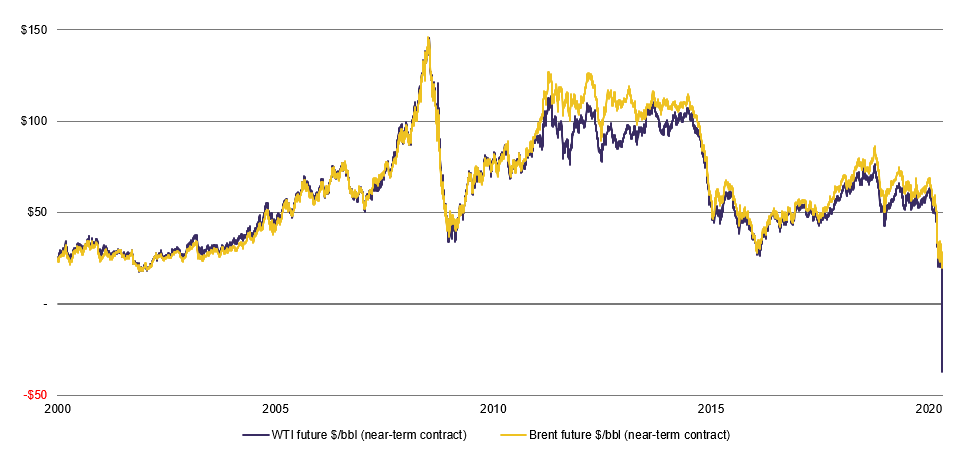Wealth Management: Strategy blog – Oil and troubled waters II

Strategy team - Kevin Gardiner (Wealth Management)
Negative interest rates - now negative oil prices. How worried should we be?
The prices of most things don't go below zero, even when there is excess supply. Oil, however, is different because - unlike all those unwanted books in the attic - it is hard to dispose of and expensive to hoard.
The immediate cause of the rout is the collapse in demand combined with the lack of physical storage for onshore crude produced in the US. Travel has all but stopped, and energy usage generally is down sharply, but the stuff is still coming out of the ground, and someone has to take delivery of it.
Click on image to enlarge
The imbalance has been particularly pronounced in the case of the May futures contract for West Texas Intermediate, which is where the price first went negative, but as we can see today (and have already seen in the last few weeks) global prices are being hit too. Added complications are the associated loss of liquidity in some oil ETFs, though this seems to reflect an excess of speculative interest - in both directions, with would-be opportunistic buyers facing forced sellers - rather than the physical glut itself.
It is sensational news. But in macroeconomic terms it may not be as significant as the media like to suggest. It is a symptom of economic difficulties, not the cause of them.
It will certainly hit corporate profits and creditworthiness. As we've noted when prices have fallen on other occasions, there are few big users of oil in the main stock market indices, but many producers and distributors of it. Their market value has fallen already - in the US, the oil sector now accounts for just 3% of the market value of the S&P500 index (less than utilities), compared to 12% ten years ago - but it can easily fall further. Creditors - speculative grade bondholders and some banks perhaps - may also be at risk.
Moreover, the stimulative effect that usually makes lower oil prices more of a macroeconomic blessing than a curse is absent currently. Consumers' spending power may be boosted - but they are hardly able to take much advantage of that just now.
We doubt however that the collapse in oil prices tells us much we didn't already know about the world. We already have enough to worry about - oil prices are the least of it.
The episode does however remind us of the headwinds facing the sector itself.
Of course, supply will eventually slow, and lockdowns start to ease: negative prices are unlikely to be with us for long (even if they do roll along the futures curve to June or July). But the industry's hubristic talk of a "supercycle" - one of the books in my attic is "Hubbert's Peak: the Impending Oil Shortage", bought by the box-load and given to me in the 'noughties by a hedge fund manager keen to ensure we got the message - has evaporated.
It took a while. A prominent US value-oriented investment house continued to favour commodities ahead of financial assets until just a few years ago, at least in its marketing literature (to which we were often asked to respond). Now however there is wider recognition that (1) commodities are not necessarily scarce; (2) technology and substitutes evolve; (3) a wealthier population spends proportionately less on necessities; and, most recently, (4) extractive industries can damage the environment.
When demand rebounds, and supply adjusts (amplified by the closure of unprofitable capacity, and a wave of consolidation), the sector may enjoy another purple patch. A similarly-challenged sector, tobacco, managed to defy its headwinds for many years. But the long-term trends do not look good.
Remember Sheikh Yamani's quip that "The stone age didn't end because we ran out of stone": the slow passing of the oil age may now be at hand. In investment terms it may be a sector to trade, not to buy and hold.
Disclaimer
Past performance is not a guide to future performance and nothing in this blog constitutes advice. Although the information and data herein are obtained from sources believed to be reliable, no representation or warranty, expressed or implied, is or will be made and, save in the case of fraud, no responsibility or liability is or will be accepted by Rothschild & Co Wealth Management UK Limited as to or in relation to the fairness, accuracy or completeness of this document or the information forming the basis of this document or for any reliance placed on this document by any person whatsoever. In particular, no representation or warranty is given as to the achievement or reasonableness of any future projections, targets, estimates or forecasts contained in this document. Furthermore, all opinions and data used in this document are subject to change without prior notice.
